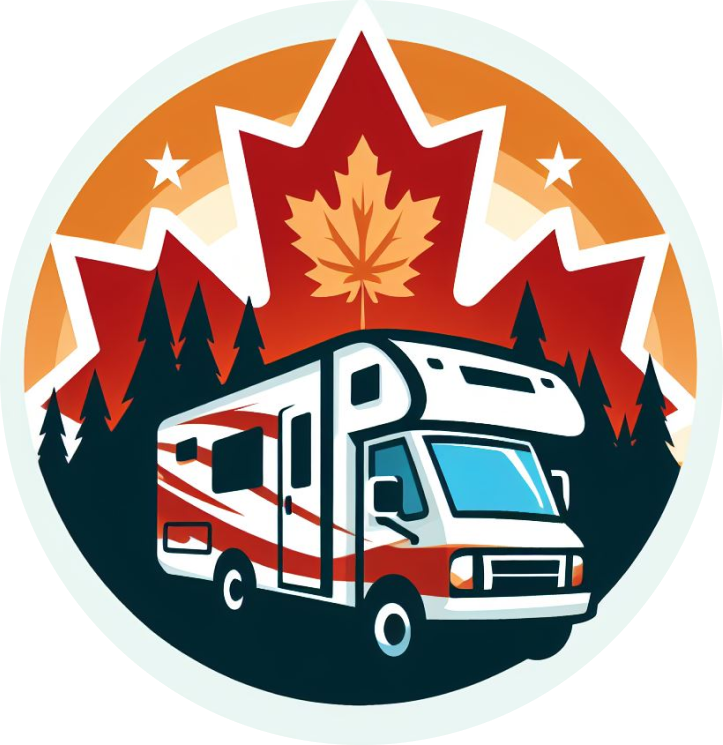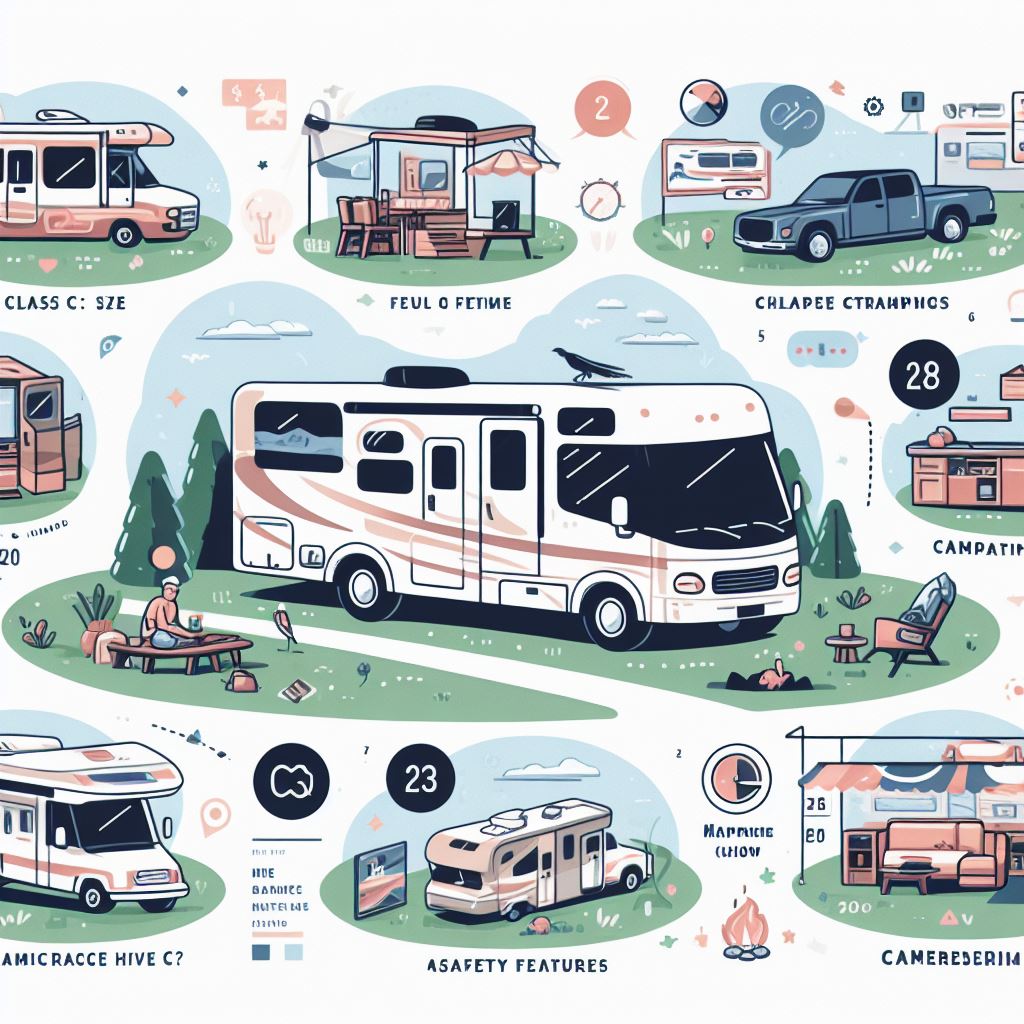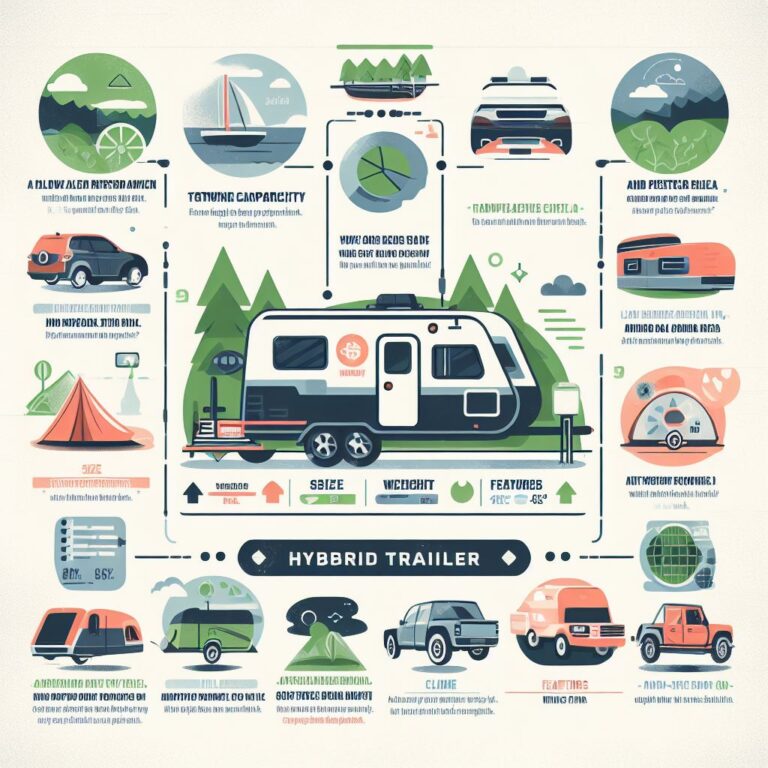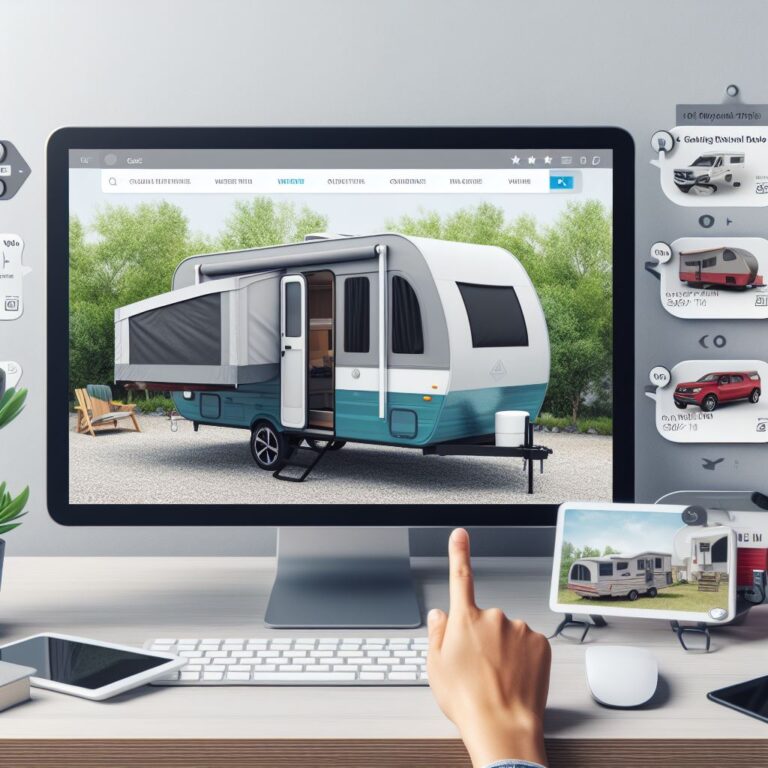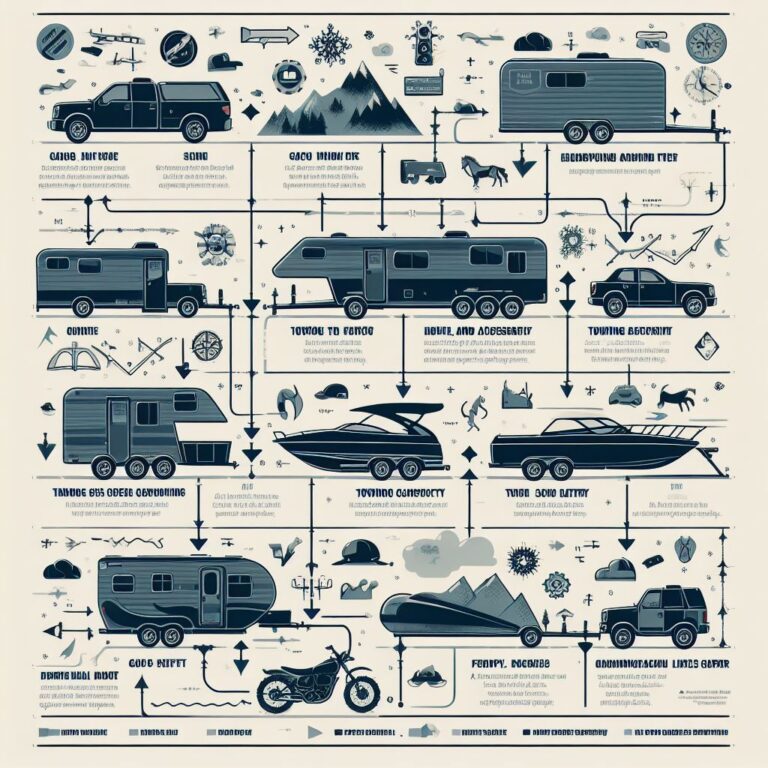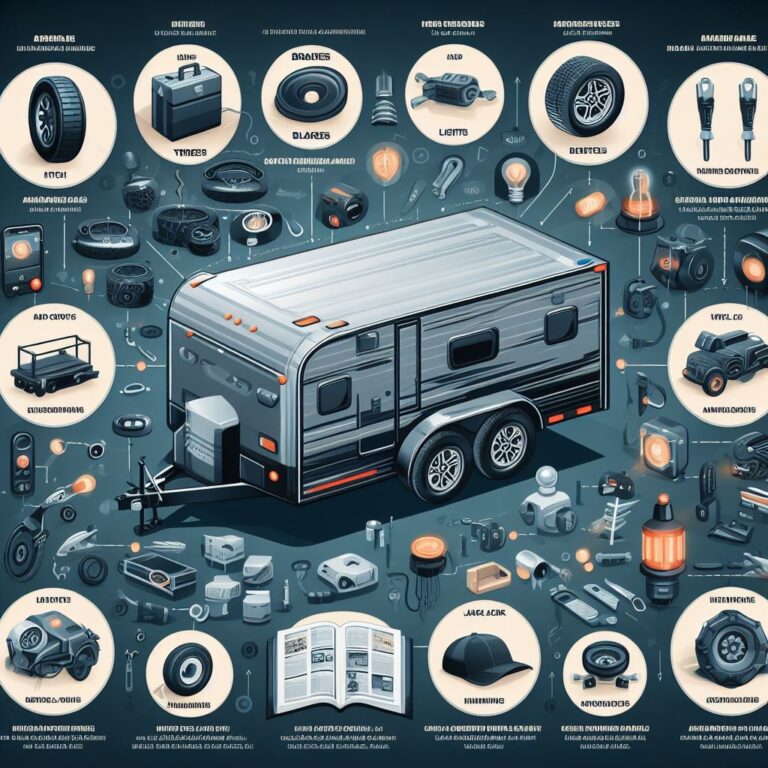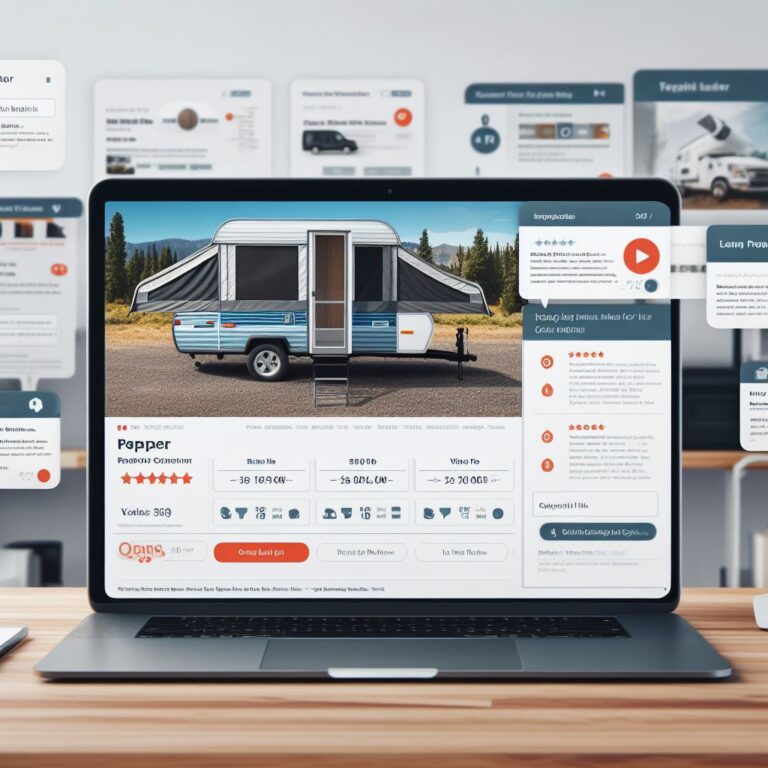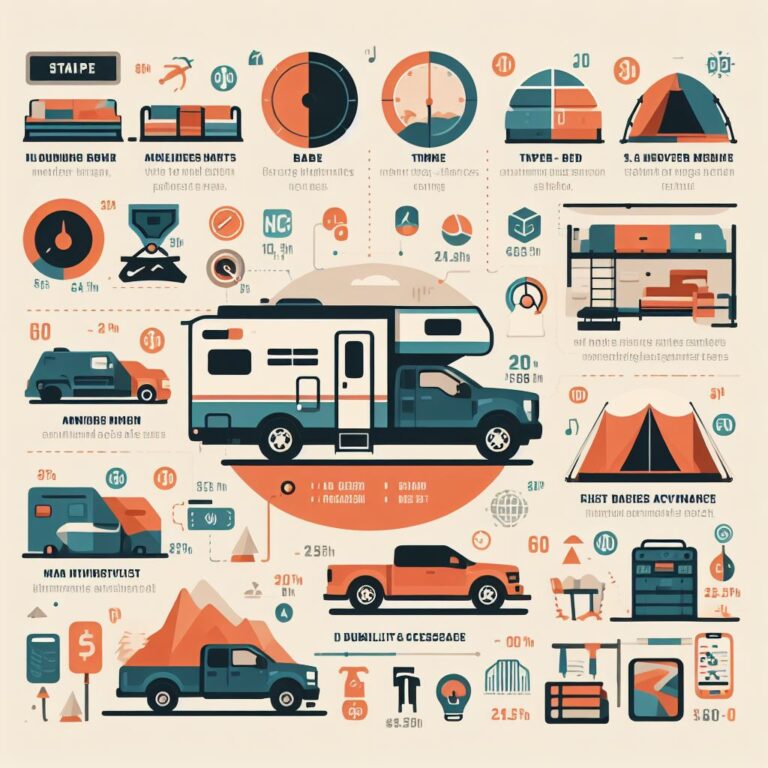How To Choose Class A Motorhome $125,000 – $500,000 Sleeps up to 8 6.4 to12.2 M(21-40 FT)
Understanding Motorhome Specifications and Price Ranges
Motorhomes, often regarded as a moving haven, come with various specifications that directly impact their price range. From the model, size, to luxurious amenities, the spectrum of specifications is comprehensive and flexible to cater to varying buyers’ preferences. Smaller models often come at affordable prices, being light on the pocket and easier to handle. In contrast, the larger, more luxurious models, equipped with advanced features like satellite TV, solar panels, or even a spacious living room, undoubtedly come with a bigger price tag.
It’s essential that buyers have a proper understanding of the different factors contributing to the price tag. For instance, the type of motorhome – whether it’s Class A, B, or C models, they each range significantly in price. Class A models, being the most luxurious, come with a hefty price, starting around $100,000 and can go up to $1,000,000. Class B and C models, although smaller and with fewer amenities, are ideal for budget-conscious buyers, with prices starting around $40,000. The sleeping capacity also influences the price – more berths mean a steeper cost. Hence, a proper understanding of these specifications can help prospective buyers make an informed purchasing decision.
Additionally, the brand and age of a motorhome also play a significant role in determining its price. Renowned brands that are famous for their quality and durability usually have higher prices compared to lesser-known brands. Similarly, newer models with more advanced features will cost more than older ones with outdated technology.
• The type of engine used in the motorhome can drastically affect its price range as well. Diesel engines are generally more expensive due to their longevity and fuel efficiency compared to petrol engines.
◦ Class A motorhomes often come equipped with diesel engines, contributing to their high price.
◦ On the other hand, Class B and C models typically use petrol or gas engines which make them relatively cheaper.
• Another critical factor is customization options available. Some manufacturers offer bespoke services where buyers can specify certain aspects like interior design or additional amenities according to their preference.
◦ Customization can significantly increase the final price depending on how extensive the changes are.
• Lastly, it’s important not to overlook maintenance costs when considering buying a motorhome. These vehicles require regular servicing and upkeep which adds up over time.
◦ Larger models may need more frequent maintenance due to increased wear and tear from heavier usage.
◦ Older models might require costly repairs if parts start failing or become obsolete.
In conclusion, understanding these specifications will provide potential buyers with an insight into what they’re investing in before making any financial commitments towards purchasing a motorhome. It’s always recommended for individuals interested in owning one of these mobile homes should do thorough research regarding different factors affecting prices so they could find something within their budget without compromising on essential features required by them.
Key Features of Luxury Motorhomes
When it comes to deluxe recreation vehicles, luxury motorhomes are the pinnacle of comfort and convenience. These motorhomes showcase exceptional design, offering a large space with all the bells and whistles. High-end kitchen appliances, sumptuous bedding and furniture, as well as deluxe bathroom facilities often find their way into these mobile homes. Many of these luxury motorhomes also feature expandable sides, known as “slide-outs”, which create additional living space when the vehicle is parked.
Modern technology has found its way into these motorhomes too. State-of-the-art entertainment systems, fully integrated smart home technology, satellite navigation and reversing cameras are just some of the features that come as standard in many high-end models. From advanced air conditioning systems to underfloor heating, technological advancements make these motorhomes a home away from home. Automatic levelling jacks, which stabilise the motorhome once parked, eliminate the hassle of manual adjustments. These features underscore the commitment to convenience and ease that luxury motorhomes embody.
Moreover, luxury motorhomes are often equipped with high-quality construction materials. From the exterior to the interior, every detail is meticulously crafted using premium materials such as hardwood cabinetry, leather upholstery and stainless steel appliances. This not only enhances their aesthetic appeal but also ensures durability and longevity.
• Exceptional Design: Luxury motorhomes offer spacious interiors complete with high-end kitchen appliances, luxurious bedding and furniture, along with deluxe bathroom facilities.
• Slide-Outs: Many models feature expandable sides or “slide-outs” that provide additional living space when parked.
• Advanced Technology: These motorhomes come equipped with state-of-the-art entertainment systems, fully integrated smart home technology, satellite navigation and reversing cameras for enhanced convenience.
• Comfort Features: Technological advancements like advanced air conditioning systems and underfloor heating ensure these vehicles truly feel like a home away from home.
• Stability Features: Automatic levelling jacks stabilise the vehicle once it’s parked – no more manual adjustments needed!
Furthermore, owners of luxury motorhomes can enjoy superior service support. Many manufacturers offer dedicated customer service teams who are ready to assist at any time. They may also have access to exclusive clubs or societies where they can meet other enthusiasts while enjoying special benefits such as priority servicing or discounts on parts and accessories.
Luxury Motorhome Services:
• Superior Customer Service: Owners often have access to dedicated customer service teams who are available round-the-clock for assistance.
• Exclusive Clubs/Societies Access: Ownership may include membership in exclusive clubs or societies offering various perks including priority servicing or discounts on parts/accessories.
In conclusion, luxury motorhomes represent an investment in comfort, convenience and quality – providing all the amenities one could wish for in a mobile home setting.
The Importance of Size and Sleeping Capacity in Motorhomes
Size plays a determining role in the comfort, practicality, and overall experience of motorhome ownership. Varying length from as small as 16 feet to as large as 40 feet, motorhomes offer a range of size options to meet both personal preferences and logistical constraints. The size of a motorhome not only affects the manoeuvrability on the road but also dictates the internal living and storage spaces. Even a few feet difference can make a significant impact on the amenities you can accommodate – whether it’s a king size bed or a full-size refrigerator.
Equal in importance to size is the sleeping capacity of a motorhome. This directly influences how many people can conveniently travel and stay in the vehicle. If you have a larger family, or simply prefer hosting guests on your road trips, choosing a motorhome with a higher sleeping capacity is crucial. However, keep in mind that an increased sleeping capacity may mean a compromise on open living spaces or additional amenities. Balancing these two factors is essential in selecting a motorhome that suits your needs.
To further illustrate, here are some key points to consider:
• The size of a motorhome can range from 16 feet to 40 feet. This wide range allows for a variety of options depending on individual needs and preferences.
• The manoeuvrability of the vehicle is directly affected by its size. Larger motorhomes may be more challenging to navigate in tight spaces or narrow roads.
• Internal living and storage space is also dictated by the size of the motorhome. A larger vehicle will naturally provide more room for amenities such as full-size appliances, larger beds, and additional seating areas.
• Sleeping capacity refers to how many people can comfortably sleep in the vehicle overnight. This number can vary greatly depending on the layout and design of the motorhome.
• If you frequently travel with a large group or host guests during your trips, it’s essential to choose a motorhome with sufficient sleeping capacity.
• However, keep in mind that increasing sleeping capacity may mean sacrificing open living spaces or extra amenities like an additional bathroom or expanded kitchen area.
In conclusion:
Choosing an appropriately sized motorhome with adequate sleeping capacity requires careful consideration. It’s important not only for comfort but also practicality – ensuring everyone has enough space while still maintaining easy maneuverability on the road.
Budgeting for a High-End Motorhome
Investing in a high-end motorhome can be a luxurious and life-changing experience. However, it’s important to remember that purchasing a lavish vehicle of this nature necessitates significant financial planning. These motorhomes can range anywhere from $200,000 to over a million dollars, encompassing a diversified palette of features, amenities, and upgrades. Therefore, potential buyers should conduct detailed research on various models, finance options and associated costs, such as insurance, maintenance, and storage before embarking on their motorhome journey.
Coming up with a strategic budget plan for a high-end motorhome requires thorough consideration of both upfront costs and ongoing expenses. Upfront costs include the purchase price of the motorhome itself and initial modifications, if any. Monthly costs entail loan payments, insurance, fuel, regular maintenance, and possibly campground fees. It’s also advised to set aside funds for unexpected repairs and emergency situations. This in-depth analysis and planning can help prospective buyers achieve their dream motorhome acquisition without undermining their financial stability.
Here are some key points to consider when budgeting for a high-end motorhome:
• Initial Purchase Price: The price of a luxury motorhome can vary significantly, ranging from $200,000 to over a million dollars. This initial cost will be the most significant upfront expense.
• Financing Options: Consider different finance options and interest rates available. It’s important to find an option that suits your financial situation best.
• Insurance Costs: High-end motorhomes typically come with higher insurance premiums due to their value. Research various insurance providers to get the best deal.
• Maintenance Expenses: Regular maintenance is essential for keeping your motorhome in top condition. These costs include routine services, tire replacements, brake checks etc., which can add up over time.
• Fuel Consumption: Luxury motorhomes are not known for their fuel efficiency. Therefore, it’s crucial to factor in the cost of fuel into your monthly expenses.
• Storage Fees: If you don’t have space at home to store your vehicle or if you live in an area with harsh winters, you may need off-site storage which adds extra costs.
• Campground Fees: Depending on how often and where you plan on traveling with your RV, campground fees might be another ongoing expense worth considering.
• Emergency Funds: Lastly but importantly, set aside funds for unexpected repairs and emergencies such as breakdowns or damages caused by unforeseen incidents like accidents or weather-related events.
By carefully considering all these aspects before making a purchase decision, prospective buyers can ensure they’re financially prepared for owning a high-end motorhome without jeopardizing their financial stability and peace of mind.
Examining the Benefits of Class A Motorhomes
Class A motorhomes stand at the pinnacle of the recreational vehicle world, with their luxury amenities and spacious layouts stealing the spotlight. They offer an array of benefits that make travelling not only more comfortable but also more enjoyable. A key advantage is their sheer size, which makes them ideal for larger families or groups wanting to travel together. These motorhomes are akin to a compact house on wheels, offering full-sized appliances, comfortable seating areas, king or queen-sized beds, and even some added luxuries such as washers and dryers, or in some cases, a small garage for a vehicle or additional storage.
Another notable advantage of Class A motorhomes centres on the quality of the driving experience. The elevated driving position provides an expanded view of the road and scenery, certainly transforming every trip into a scenic journey. Most Class A models also have powerful engines and systems that make even long-haul trips feel relaxing and effortless. Comfort features such as air suspension systems and automatic levelling systems further enhance the ride quality. Its notable fuel capacity also ensures fewer stops and interruptions, meaning more time spent enjoying the open road. The robust construction, spacious confines and enhanced drivability are significant factors in the enduring popularity of Class A motorhomes among the Canadian travel enthusiasts.
Let’s delve deeper into the benefits that Class A motorhomes offer:
• Spaciousness: One of the most significant advantages of Class A motorhomes is their sheer size. They provide ample space for larger families or groups, making them ideal for travelling together without feeling cramped.
• Home-like Amenities: These motorhomes are equipped with full-sized appliances, comfortable seating areas and king or queen-sized beds. Some even have added luxuries such as washers and dryers or a small garage for additional storage, offering all the comforts of home on wheels.
• Superior Driving Experience: The elevated driving position in a Class A motorhome offers an expanded view of the road and scenery. Most models also feature powerful engines and systems that make long trips feel relaxing and effortless.
• Advanced Comfort Features: Many Class A models come with air suspension systems and automatic levelling mechanisms to enhance ride quality further.
• Large Fuel Capacity: Another advantage is their notable fuel capacity which ensures fewer stops along the way, meaning more time spent enjoying your journey rather than refuelling.
• Robust Construction: The sturdy build quality of these vehicles makes them durable choices that can withstand different weather conditions while providing a safe travel environment.
In conclusion, it’s clear why Canadian travel enthusiasts prefer Class A motorhomes due to its spacious confines, enhanced drivability features and high-quality construction that guarantees comfort during any trip.
Navigating the Motorhome Market
Navigating the exciting yet seemingly complex motorhome market requires some fundamental knowledge and clear understanding of your needs. Here in Canada, the offerings are broad, which makes it easier yet challenging to choose. The first step includes identifying the type of motorhome most suited to your lifestyle, travel needs and budget. Choices range from smaller Class B motorhomes perfect for solo adventurers or couples, to Class C motorhomes that offer a balance of space and convenience, and up to Class A motorhomes which are the pinnacle of luxury and comfort.
Understanding the ins and outs of each motorhome class, their specifications, and features is essential. Equally important is having a precise idea of preferred length, sleeping capacity, and layout needs. A well-informed look at the unit’s performance, efficiency, and the potential resale value can make a significant difference when it comes to making a final decision. Additionally, don’t forget to factor in the maintenance and running costs. After all, falling in love with a motorhome is easy. Making sure it fits into your budget and lifestyle is the real challenge.
Continuing your research, it’s also crucial to consider the amenities and extras that each motorhome offers. Some may come with state-of-the-art kitchen appliances, luxurious bathrooms, or high-tech entertainment systems. Others might offer practical features like solar power capabilities or extra storage space.
• Class B Motorhomes: These compact units are ideal for solo travelers or couples who value mobility and simplicity over luxury. They often include basic amenities such as a bed, small kitchenette, and toilet facilities.
◦ Pros: Easy to drive and park; lower cost of purchase and maintenance; better fuel efficiency
◦ Cons: Limited living and storage space; fewer amenities compared to larger classes
• Class C Motorhomes: A step up in size from Class B, these motorhomes provide more room for families while still offering relative ease of maneuverability on the road.
◦ Pros: More spacious than Class B with additional sleeping areas; usually includes more comprehensive kitchen facilities
◦ Cons: Higher costs (purchase price, fuel consumption); can be challenging to navigate in tight spaces
• Class A Motorhomes: The largest type of motorhome available on the market is perfect for those seeking maximum comfort during their travels. It often comes equipped with all modern conveniences one could wish for – from full-sized kitchens to king-sized beds.
◦ Pros: Spacious living area suitable for long-term travel or full-time living; many luxury features included
◦ Cons: Highest initial purchase price; costly maintenance expenses due to size and complexity
It’s important not only to fall in love with a motorhome but also ensure it fits within your budget constraints without compromising too much on your needs or wants. Keep an eye out for deals at local dealerships or online platforms specializing in used RVs – you never know when you might find the perfect match!
Factors to Consider When Purchasing a Motorhome
Investing in a motorhome can be a significant financial decision which requires astute consideration. One of the primary factors to take into account is the frequency of usage. If you plan to use it only a few weeks a year for vacations, a less expensive model or even a rental might suffice. However, if you’re considering full-time RV living, or long, cross-country journeys, you might want to invest in a newer, more feature-rich model that provides lasting comfort and durability.
Another critical factor is the number of people the motorhome should accommodate. If you have a large family or plan to take frequent trips with friends, consider a model with ample sleeping and living space. On the other hand, for couples or solo travellers, a compact model could be more suitable, offering easier manoeuvrability and lower running costs. Other factors such as fuel efficiency, maintenance requirements, and storage space also play a significant role in your choice of motorhome. Always remember, the perfect motorhome isn’t necessarily the most expensive one, but the one which best suits all your needs.
When purchasing a motorhome, you should also consider the following factors:
• The type of motorhome: There are different types of motorhomes available in the market today. These include Class A, B and C motorhomes, fifth-wheel trailers, travel trailers and pop-up campers. Each has its own features and benefits which should be carefully considered.
• Budget: Your budget will significantly influence your choice of motorhome. While some models can be quite affordable, others may come with hefty price tags due to their luxurious amenities or advanced technology.
• Resale value: If you plan on selling your motorhome at some point in the future, it’s important to choose a model that retains its value well over time.
• Amenities: Depending on how comfortable you want to be while travelling, consider what amenities are essential for you. This could range from basic necessities like cooking facilities and bathrooms to luxury items such as large flat-screen televisions and state-of-the-art sound systems.
• Insurance costs: Don’t forget about insurance when considering your overall budget for owning a motorhome. Some models may have higher insurance premiums than others due to their size or cost.
In conclusion, choosing the right motorhome involves careful consideration of numerous factors including usage frequency, accommodation capacity, type of vehicle desired based on lifestyle needs and financial implications among other things.
Evaluating Motorhome Performance and Efficiency
In the realm of recreational vehicles, performance and efficiency could make all the difference in your travel experience. The performance of a motorhome pertains to its ability to handle different road conditions, the smoothness of its ride, and its overall maneuverability. Factors such as horsepower, torque and suspension type are integral to a motorhome’s performance. Ideally, a motorhome should possess adequate power for climbing steep hills, have a stable and comfortable ride on bumpy roads, and remain easy to steer despite its size.
Fuel efficiency, on the other hand, is a significant concern when evaluating a motorhome. Gas consumption can greatly affect your journey’s overall budget, especially when you consider the massive size and weight of these vehicles. While traditionally motorhomes aren’t known for their fuel efficiency, recent advancements in technology have led to improvements in this area. Some modern motorhomes now offer better mileage per gallon, an essential factor to consider when navigating long distances. Consequently, thoroughly evaluating a motorhome’s performance and efficiency is crucial before making a purchase.
Here are some key points to consider when evaluating a motorhome’s performance and efficiency:
• Horsepower: This determines the power of your motorhome. A high horsepower means that the vehicle can easily climb steep hills without straining the engine.
• Torque: It is also crucial in determining how well a motorhome performs, especially when it comes to towing other vehicles or heavy loads. The higher the torque, the better its pulling capacity.
• Suspension Type: Different types of suspension offer varying levels of comfort on bumpy roads. Ensure you choose one that best suits your travel needs for maximum comfort and stability.
• Maneuverability: Despite their size, good motorhomes should be easy to steer and handle different road conditions with ease.
When it comes to fuel efficiency:
• Gas Consumption: Given their size and weight, gas consumption is typically high in motorhomes. However, this doesn’t mean you can’t find efficient models out there. Always check for ones offering better mileage per gallon as they could significantly reduce your overall journey cost.
• Technological Advancements: Modern technology has brought about significant improvements in fuel efficiency among recreational vehicles. Look out for these advancements such as hybrid engines or energy-efficient appliances when purchasing a new model
In conclusion:
Thoroughly evaluating both performance features like horsepower, torque, suspension type and maneuverability alongside fuel-efficiency factors such as gas consumption rates and technological advancements will help prospective buyers make an informed decision before investing in a motorhome.
Making a Smart Investment: The Resale Value of Class A Motorhomes
When deciding to purchase a Class A Motorhome, resale value is a significant factor to consider. As these vehicles can represent a significant investment, understanding the potential return is necessary for making an informed decision. Several factors influence the resale value, including the brand, model, maintenance history, and overall vehicle condition. Brands renowned for their quality and reliability, such as Winnebago or Thor Motor Coach, tend to command higher resale values.
In addition, the aftermarket enhancements you make on your motorhome potentially affect its resale value. For instance, upgraded appliances or high-end technological features can contribute to an increased resale value. Keeping meticulous maintenance records can also demonstrate to potential buyers that the vehicle has been well cared for. However, these are not guaranteed ways to increase your motorhome’s resell value; they are just factors that can potentially be beneficial. Differences in market trends and individual preferences can still impact the final resell price.
To maximize the resale value of your Class A Motorhome, there are several points to consider:
• Brand and Model: Premium brands like Winnebago or Thor Motor Coach generally have higher resale values due to their reputation for quality and reliability. The model is also crucial; newer models with updated features will typically command a higher price.
• Maintenance History: Keeping detailed records of all maintenance work done on the motorhome can significantly enhance its appeal to potential buyers. This shows that you’ve taken good care of the vehicle, which may translate into fewer problems for them down the line.
• Vehicle Condition: The general state of your motorhome plays a significant role in determining its resale value. Ensure it’s clean, well-maintained, and free from any major mechanical issues before putting it up for sale.
• Aftermarket Enhancements: Upgrades such as high-end appliances or technological enhancements can increase the vehicle’s value. However, be careful not to over-customize as this might limit its appeal to a broader range of buyers.
Remember that while these factors can potentially influence your motorhome’s resell value positively, they are not guarantees. Market trends and individual buyer preferences will ultimately determine how much you’ll get when selling your Class A Motorhome.
Additionally, knowing where to sell is equally important in getting a good deal:
• Dealerships: They offer convenience but usually at lower prices because they need room for profit margins.
• Private Sale: Selling directly allows you more control over pricing but requires more effort in terms of advertising and dealing with prospective buyers.
In conclusion, making smart investments in maintaining and upgrading your Class A Motorhomes could lead to better returns when it comes time to sell. However, always keep an eye on market trends and adjust accordingly.
Tips for Maintaining Your Motorhome Investment
Investing in a motorhome goes beyond the initial purchase. It also involves preserving the vehicle in star shape condition to ensure it delivers optimal performance and sustains its value. To keep your motorhome investment intact, routine checks and maintenance ought to top your priority list. The extent of this may range from ensuring the tires are properly inflated and rotated regularly, habitually changing fluids such as oil, radiator coolant, and brake fluid to avoid engine failure, to checking the roof seals and seams regularly to avoid water leakages which could turn out tragic for your motorhome.
Even more, the interior parts of your motorhome also require regular upkeep to maintain a clean and comfortable environment. This might involve cleaning the upholstery, maintaining the onboard appliances, and checking the heating and cooling systems. Small changes like keeping your motorhome clean, parking it in a covered area to protect it from harsh weather conditions, and emptying the water systems during winter to prevent pipe bursts can also go a long way in preserving your motorhome. Remember, preventative maintenance is not just for improvement purposes, but also goes a long way in prolonging the lifespan and maintaining the value of your investment.
Here are some tips to help you maintain your motorhome investment:
• Regularly check and ensure the tires are properly inflated and rotated. This will not only enhance safety but also improve fuel efficiency.
• Change fluids such as oil, radiator coolant, and brake fluid regularly. Neglecting this can lead to engine failure which could be quite costly.
• Check the roof seals and seams often to avoid water leakages. Water damage can be a disastrous issue for any motorhome owner, leading to expensive repairs or even total loss of the vehicle.
• Keep the interior parts of your motorhome clean and well-maintained. This includes cleaning upholstery, maintaining onboard appliances, checking heating/cooling systems among others.
• Park your motorhome in a covered area whenever possible. Exposure to harsh weather conditions can speed up wear and tear on both exterior and interior components of your vehicle.
• Empty water systems during winter months if you live in areas where temperatures drop below freezing point. Frozen pipes may burst causing significant damages that might require extensive repairs or replacements.
In conclusion, preventative maintenance is key when it comes to preserving your motorhome investment. Not only does it improve its performance but also prolongs its lifespan while maintaining value over time.
Remember: Your Motorhome is an asset; treat it with care!
What are the key features to consider in luxury motorhomes?
The key features in luxury motorhomes can include things like high-quality interior materials, advanced technology systems, ample storage space, and high-performance engines.
How does size and sleeping capacity affect my motorhome purchase decision?
The size and sleeping capacity of a motorhome can greatly affect your purchasing decision because it directly impacts the number of people the motorhome can comfortably accommodate.
How should I budget for a high-end motorhome?
Budgeting for a high-end motorhome involves considering not only the initial purchase price but also the ongoing costs of ownership, such as maintenance, insurance, and fuel.
What are the benefits of Class A motorhomes?
Class A motorhomes are known for their spacious interiors, wide range of amenities, and ability to tow a vehicle. They also offer the highest level of comfort and convenience among the different types of motorhomes.
What factors should I consider when purchasing a motorhome?
When purchasing a motorhome, consider factors such as your budget, the size and sleeping capacity of the motorhome, the amenities and features it offers, its fuel efficiency, and its potential resale value.
How can I evaluate a motorhome’s performance and efficiency?
You can evaluate a motorhome’s performance and efficiency by looking at its engine size and type, its fuel economy, its driving and handling capabilities, and the reliability of its systems and components.
How can I ensure that my motorhome investment is a smart one?
You can make a smart motorhome investment by carefully evaluating the motorhome’s features, performance, and efficiency, and considering its potential resale value. It’s also important to maintain your motorhome properly to preserve its value.
What are some tips for maintaining my motorhome investment?
Regularly servicing your motorhome, keeping it clean, addressing repairs promptly, and storing it properly when not in use are all effective ways to maintain your motorhome investment.
How does the resale value of Class A motorhomes compare to other types?
Class A motorhomes typically have a high resale value due to their range of amenities and comfortable living space. However, the exact resale value can depend on factors such as the motorhome’s condition, age, and mileage.
How can I effectively navigate the motorhome market?
Navigating the motorhome market effectively involves doing thorough research, understanding the different types and features of motorhomes, setting a realistic budget, and considering the resale value of the motorhome.
- How To Choose TIPHOPE RV Accessories - February 10, 2024
- How To Choose Joinfworld RV Accessories - February 10, 2024
- How To Choose Conntek RV Accessories - February 9, 2024
